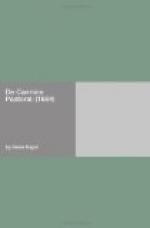Now there may be more kinds of Subjects than Servius or Donatus allow, for they confine us to that Number which Virgil hath made use of, tho Minturnus in his second Book de Poeta declares against this opinion: But as a glorious Heroick action must be the Subject of an Heroick Poem, so a Pastoral action of a Pastoral; at least it must be so turn’d and wrought, that it might appear to be the action of a Shepherd; which caution is very necessary to be observ’d, to clear a great many difficulties in this matter: for tho as the Interpreters assure us; most of Virgils Eclogues are about the Civil war, planting Colonys, the murder of the Emperor, and the like, which in themselves are too great and too lofty for humble Pastoral to reach, yet because they are accomodated to the Genius of Shepherds, may be the Subject of an Eclogue, for that sometimes will admit of Gods and Heroes so they appear like, and are shrouded under the Persons of Shepherds: But as for these matters which neither really are, nor are so wrought as to seem the actions of Shepherds, such are in Moschus’s Europa, Theocritus’s Epithalamium of Helen, and Virgil’s Pollio, to declare my opinion freely, I cannot think them to be fit Subjects for Bucolicks: And upon this account I suppose ’tis that Servius in his {27} Comments on Virgil’s Bucoliks reckons only seven of Virgil’s ten Eclogues, and onely ten of Theocritus’s thirty, to be pure Pastorals, and Salmasius upon Solinus says, that amongst Theocritus’s Poems there are some which you may call what you please Beside Pastorals: and Heinsius in his Scholia upon Theocritus will allow but Ten of his Idylliums to be Bucoliks, 1. 2. 3. 4. 5. 6. 7. 8. 9. 11. for all the rest are deficient either in matter or form, and from this number of pure pastoral Idylliums I am apt to think, that Theocritus seems to have made that Pipe, on which he tun’d his Pastorals and which he consecrated to Pan of ten Reeds, as Salmasius in his notes on Theocritus’s Pipe hath learnedly observed: in which two Verses always make one Reed of the Pipe, therefore all are so unequal, like the unequal Reeds of a Pipe, that if you put two equals together which make one Reed, the whole inequality consists in ten pairs; when in the common Pipes there were usually no more then seven Reeds, and this the less curious observers have heedlessly past by.
Some are of opinion that whatever is done in the Country, and in one word, every thing that hath nought of the City in it may be treated of in Pastorals; and that the discourse of Fishers, Plow-men, Reapers, Hunters, and the like, belong to this kind of Poetry: which according to the Rule that I have laid down cannot be true for, as I before hinted nothing but the action of a {28} Shepherd can be the Subject of a Pastoral.




